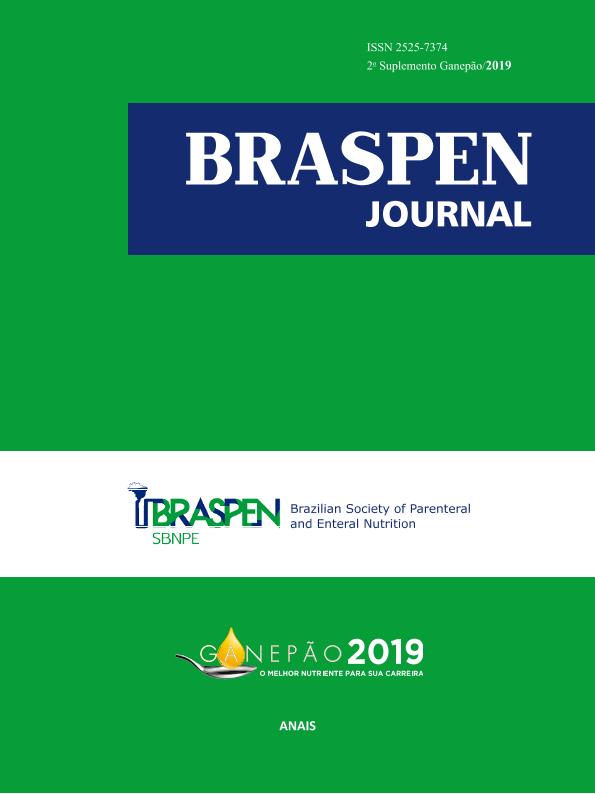Mostrar el registro sencillo del ítem
dc.contributor.author
Cucick, Ana Clara Candelaria
dc.contributor.author
de Moreno, Maria Alejandra

dc.contributor.author
Leblanc, Jean Guy Joseph

dc.contributor.author
Gombossy de Melo Franco, Bernadette Dora
dc.date.available
2023-04-12T12:53:11Z
dc.date.issued
2019
dc.identifier.citation
Bioavailability and intestinal beneficial effect of folate produced by selected lactic acid bacteria in bioenriched fermented milk; 8º Congresso Brasileiro de Nutrição Integrada; 21º Fórum Paulista de Pesquisa em Nutrição Clínica e Experimental ; 4º Congresso Brasileiro de Prebióticos, Probióticos e Simbióticos; São Paulo; Brasil; 2019; 53-53
dc.identifier.issn
2525-7374
dc.identifier.uri
http://hdl.handle.net/11336/193402
dc.description.abstract
Introdução: Folate deficiency is a common problem that can cause severe health issues. Excessive intake of folic acid can cause severe side-effects. The production of the natural form of this vitamin by selected LAB it’s a safe alternative to increase folate intakes. Objetivos: The aim of this study was to evaluate the bioavailability of folate produced by some selected lactic acid bacteria strains in fermented milk, using an animal model. Materiais e Métodos: Five Streptococcus thermophilus and one Lactobacillus plantarum strains, were added alone and in co-cultures to skim milk, and tested for folate production after 24h at 37ºC. The co-culture that produced the highest folate levels was tested for bioavailability of the produced folate, using a depletionrepletion model in BALB/c mice. The experimental study comprised of 14 days of depletion and 21 days of repletion of vitamin B9. 30 BALB/c mice were randomly divided into 6 groups: 1. control (only control diet); 2. depleted (only deficient diet); 3. depleted-repleted (control diet); 4. bioenriched fermented milk (BFM) (milk fermented with the selected strains); 5. unfermented milk (pasteurized milk) and 6. unfermented milk added of folic acid (same concentration of the BFM). The mice were sacrificed at the end of the experiments (35 days) by cardiac puncture, and the blood, kidneys, liver, spleen and intestine were removed for quantification of folate by the microbiological assay method and histological tests (intestine). Resultados: The highest amount of folate produced by co-cultures was 300 ng/mL (St. thermophilus 34v and Lb. plantarum 16cv). The concentration of folate in the liver, spleen and red blood cells was higher in the BFM group compared to the depleted group, and was similar to that in the depleted-repleted and control groups. The haemogram indicated that haemoglobin, haematocrit and red blood cells were higher in the BFM group than in the control group, while these indicators were lower in the depleted group. Folic acid added to the milk did not affect these indicators. At the intestinal level, the depleted group caused a decrease of the villi length and an increase in the crypts length, meaning that the absence of this vitamin damages the intestinal mucosa. The BFM and the milk with folic acid resulted in a good villi/crypt length relation, equal or better than the control group. Conclusão: To the best of our knowledge, this was the first intestinal level study in mice that found beneficial health outcomes of the intake of a bioenriched fermented milk with selected folate producing lactic acid bacteria. In addition, the increase of the haemoglobin, haematocrit and red blood cells suggest that the bioenriched fermented milk had a beneficial effect in the animals. Acknowledgements: FAPESP 2013/07914-8 and 2016/50480-7.
dc.format
application/pdf
dc.language.iso
por
dc.publisher
Sociedade Brasileira de Nutrição Parenteral e Enteral
dc.rights
info:eu-repo/semantics/openAccess
dc.rights.uri
https://creativecommons.org/licenses/by-nc-sa/2.5/ar/
dc.subject
FOLATE
dc.subject
LACTIC ACID BACTERIA
dc.subject
FERMENTATION
dc.subject
VITAMIN DEFICIENCY
dc.subject
BIOAVAILABILITY
dc.subject
FERMENTED MILK
dc.subject
VITAMIN B9
dc.subject.classification
Alimentos y Bebidas

dc.subject.classification
Otras Ingenierías y Tecnologías

dc.subject.classification
INGENIERÍAS Y TECNOLOGÍAS

dc.title
Bioavailability and intestinal beneficial effect of folate produced by selected lactic acid bacteria in bioenriched fermented milk
dc.type
info:eu-repo/semantics/publishedVersion
dc.type
info:eu-repo/semantics/conferenceObject
dc.type
info:ar-repo/semantics/documento de conferencia
dc.date.updated
2022-11-09T16:50:15Z
dc.journal.volume
34
dc.journal.number
Suppl. 2
dc.journal.pagination
53-53
dc.journal.pais
Brasil

dc.journal.ciudad
São Paulo
dc.description.fil
Fil: Cucick, Ana Clara Candelaria. Universidade de Sao Paulo; Brasil
dc.description.fil
Fil: de Moreno, Maria Alejandra. Consejo Nacional de Investigaciones Científicas y Técnicas. Centro Científico Tecnológico Conicet - Tucumán. Centro de Referencia para Lactobacilos; Argentina
dc.description.fil
Fil: Leblanc, Jean Guy Joseph. Consejo Nacional de Investigaciones Científicas y Técnicas. Centro Científico Tecnológico Conicet - Tucumán. Centro de Referencia para Lactobacilos; Argentina
dc.description.fil
Fil: Gombossy de Melo Franco, Bernadette Dora. Universidade de Sao Paulo; Brasil
dc.relation.alternativeid
info:eu-repo/semantics/altIdentifier/url/https://ganepao.com.br/wp-content/uploads/2019/09/anais-2019.pdf
dc.conicet.rol
Autor

dc.conicet.rol
Autor

dc.conicet.rol
Autor

dc.conicet.rol
Autor

dc.coverage
Internacional
dc.type.subtype
Congreso
dc.description.nombreEvento
8º Congresso Brasileiro de Nutrição Integrada; 21º Fórum Paulista de Pesquisa em Nutrição Clínica e Experimental ; 4º Congresso Brasileiro de Prebióticos, Probióticos e Simbióticos
dc.date.evento
2019-06-11
dc.description.ciudadEvento
São Paulo
dc.description.paisEvento
Brasil
dc.type.publicacion
Journal
dc.description.institucionOrganizadora
Brazilian Society of Parenteral and Enteral Nutrition
dc.description.institucionOrganizadora
Fórum Paulista de Pesquisa em Nutrição
dc.description.institucionOrganizadora
Federación Latinoamericana de Nutrición Parenteral y Entera
dc.source.libro
Libro re resumen
dc.source.revista
Braspen Journal
dc.date.eventoHasta
2019-06-14
dc.type
Congreso
Archivos asociados
